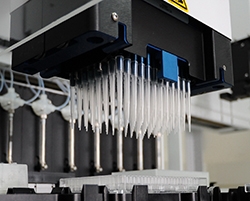Personalizing genomics toward better medicine
Dr. Ido Amit & Prof. Amos Tanay
Features

Today, when physicians asses a patient’s medical state, they only have a limited number of disease markers at hand, which means that they only have a key-hole view of a patient’s disease.
A revolutionary project initiated at the Weizmann Institute by Dr. Ido Amit and Prof. Amos Tanay is set to change all that.
Their goal is to usher in the era of personalized genomics, where clinicians, aided by tens - if not hundreds or thousands - of biomarkers, will be able to construct a true picture of a patient’s condition and, thereby, assign the most suitable treatment possible for that individual.
Dr. Amit is a genomics specialist who uses his expertise to invent next-generation sequencing methods for analyzing the information contained in our DNA (e.g., our personalized genome). Prof. Tanay has already made his mark on the study of the functioning of genomes, most notably through his highly sought-after innovative computational biology methods. These two scientists, each a proven innovator in his own right, have now joined forces to push further the boundaries of biomedical research capabilities.
Their proposed profiling method will go beyond profiling the DNA sequence itself—common to all of the human body’s 100 trillion cells—and leap forward into the realm of the unique genetic activity profile of individual cells. Fully characterizing the activity patterns of individual cells within a functioning or malfunctioning organ was considered a non-realistic dream up until recently. Based on the power of modern genomics and cutting-edge computational methods - and a heavy dose of outside-the-box thinking - this dream can now be fulfilled.
Their new methods, say Dr. Amit and Prof.Tanay, will quickly bring about a fundamental change in the way by which personalized medicine is being practiced: Instead of inferring what a patient’s condition is based on genetic tests, clinicians will be able to measure directly and comprehensively the precise state of the diseased cells, eliminating uncertainty and driving rational and evidence-based treatment.
Success in their effort will eventually bring accurate genomic profiling within the financial reach of every patient, a pivotal factor in implementing personalized medicine within the general populace.
Dr. Amit and Prof. Tanay believe that only with this capability in hand will scientists be able to truly characterize the multi-faceted processes driving complex phenomena such as cancer, autoimmune disease, aging, and neurodegeneration and to devise silver-bullet therapies to eradicate diseases. They are confident that the new capabilities they are developing will find direct and immediate translation to a clinical setting within the next few years. To fulfill this vision, their work involves concurrent efforts to improve the technology’s accuracy and sensitivity and develop innovative approaches that can decrease the cost of sequencing.
Their project includes the immediate application of the new technologies to two cancer studies aimed at improving diagnostic capabilities and therapies for cancer. Moreover, their innovations are expected to lead to a massive reduction in the sample size—biopsies—needed for comprehensive disease diagnosis and make such procedures minimally invasive.
Dr. Ido Amit is supported by the M.D. Moross Institute for Cancer Research, The Abramson Family Center for Young Scientists, The Wolfson Family Charitable Trust, the Abisch Frenkel Foundation for the Promotion of Life Sciences, the Leona M. and Harry B. Helmsley Charitable Trust, Sam Revusky, Canada, Drs. Herbert and Esther Hecht, Beverly Hills, CA, the estate of Ernst and Anni Deutsch, and the estate of Irwin Mandel. He is the incumbent of the Alan and Laraine Fischer Career Development Chair.
http://www.weizmann.ac.il/immunology/AmitLab
Prof. Amos Tanay is supported by the Helen and Martin Kimmel Award for Innovative Investigation, Pascal and Ilana Mantoux, Israel/France, The Wolfson Family Charitable Trust, The Rachel and Shaul Peles Fund for Hormone Research, and the estate of Evelyn Wellner.

A Bravo automated work station